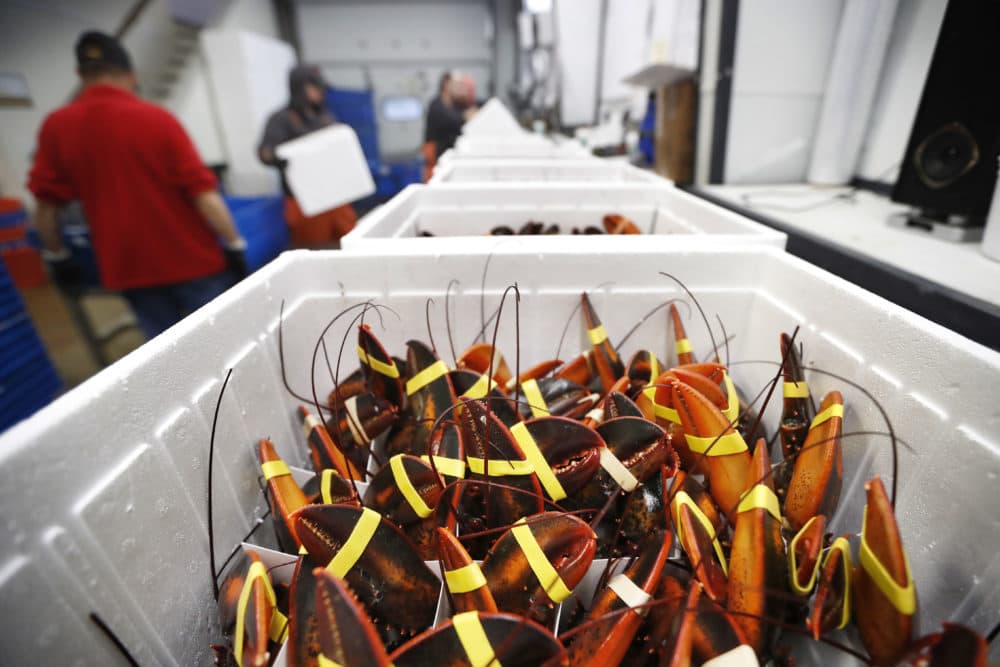Advertisement
Changes In Lobster Processing Rules On Legislature's Plate

If ever there was a topic that might easily lend itself to bipartisan agreement in Massachusetts it would be lobster, the tasty crustacean that's long been both a staple of New England cuisine and a vital part of the region's economy.
Democratic and Republican leaders on Beacon Hill are moving toward consensus on legislation that seeks to expand lobster processing, in turn growing markets and giving consumers a wider selection of lobster products at restaurants and local supermarkets. The plan received a major boost from the state's Division of Marine Fisheries, which in a recent report concluded it would deliver "economic benefits throughout the state's seafood supply chain," along with "greater access to desirable seafood products."
Pending final approval from the lawmakers, the state's lobster regulations would change to allow for in-state processing and sale of raw and frozen lobster parts that are still in the shell — claws and tails, for example — and permit seafood dealers to import shell-on lobster parts for further processing.
Current law is more limited. You can, of course, sell whole lobsters cooked or uncooked, and the meat can be sold canned or at restaurants; think lobster rolls. In 2013, the Legislature amended the statute to allow frozen shell-on tails that weigh at least 3 ounces to be sold, as well.
State Senate Minority Leader Bruce Tarr has for several years pushed to further expand legal lobster processing in Massachusetts, citing figures that show about 80% of the state's lobster catch now being shipped to Maine or Canada for processing.
"This legislation modernizes those lobster laws to bolster the fishing industry and give consumers, including local restaurants and food stores, more choices while sustainably supporting coastal fishing communities," Tarr said in a statement.
The Republican represents the coastal city of Gloucester, the state's No. 1 lobstering port. Massachusetts as a whole boasts the nation's second-largest lobster harvest, about 11% of the U.S. total. Maine, which liberalized its processing laws about a decade ago, is far and away the largest catcher, with 83% of the domestic haul.
Relaxing the current regulations would create new business opportunities in Massachusetts, Tarr and other supporters contend. One company, Topsfield-based East Coast Seafood, has already told state officials it would look to expand its processing facilities and create new jobs if the bill becomes law.
The measure easily cleared the Senate last year with support from key Democrats in coastal districts, including Sens. Mark Montigny, of New Bedford, and Michael Rodrigues, of Westport. But the House wasn't quite ready to fully embrace the idea.
First, House lawmakers sought assurances from the Division of Marine Fisheries that easing current restrictions wouldn't harm lobster conservation efforts and that regulators would be able to prevent the illegal breaking apart of juvenile lobsters that are below minimum state and federal size limits.
The agency's report, issued in December, foresaw no negative effects on Massachusetts' largest fishery.
"This is because the existing regulations and processing requirements provide multiple opportunities for law enforcement to monitor and enforce against violations of lobster conservation regulations," the report said, citing Maine's experience among other factors.
As for consumers, the availability of shell-on lobster parts such as tails and claws fits a trend toward foods that are quicker and easier to prepare and eat, the study noted. Anyone who has wrestled a live lobster into a pot of boiling water and struggled to crack shells or pry meat out with tiny forks might agree.
Encouraged by the report, House backers including Democratic Rep. Sarah Peake, of Provincetown, successfully attached language similar to Tarr's bill to a state budget that cleared the chamber last month, boosting chances of it eventually becoming law either through the budget process or separate legislation.
Peake pointed to potential benefits in coastal communities, where restaurants and seafood markets do booming business selling live lobsters during the summer tourism months, only to struggle the rest of the year.
"As the fall starts to roll in and the lobsters are still abundant, you have fewer of those clam shacks that are open and you have an overabundance of lobsters that are being landed and not enough consumers still interested in consuming the whole lobster," Peake told House colleagues. "This bill will help stabilize that and provide markets for Massachusetts lobstermen that currently don't exist today," she added.